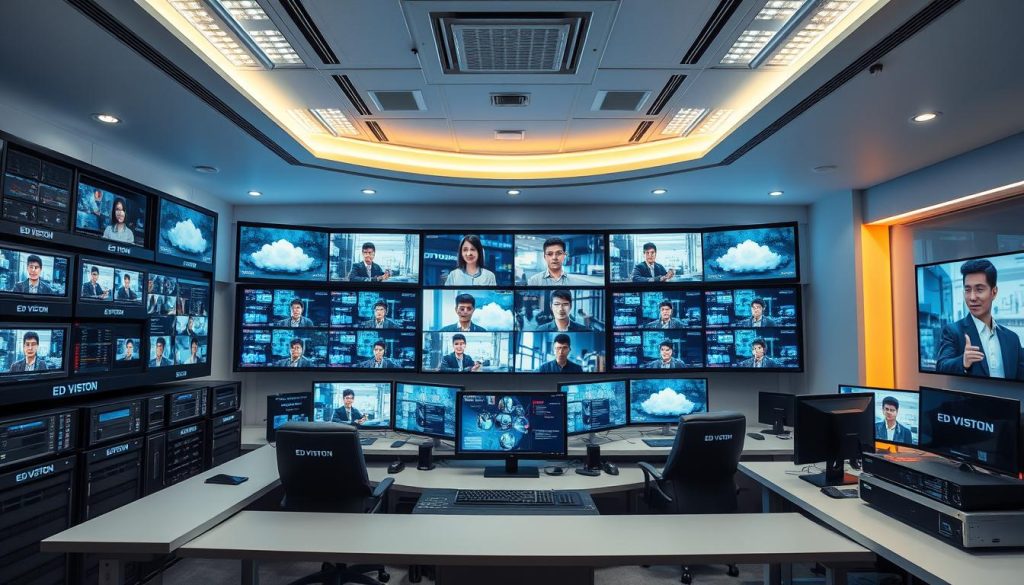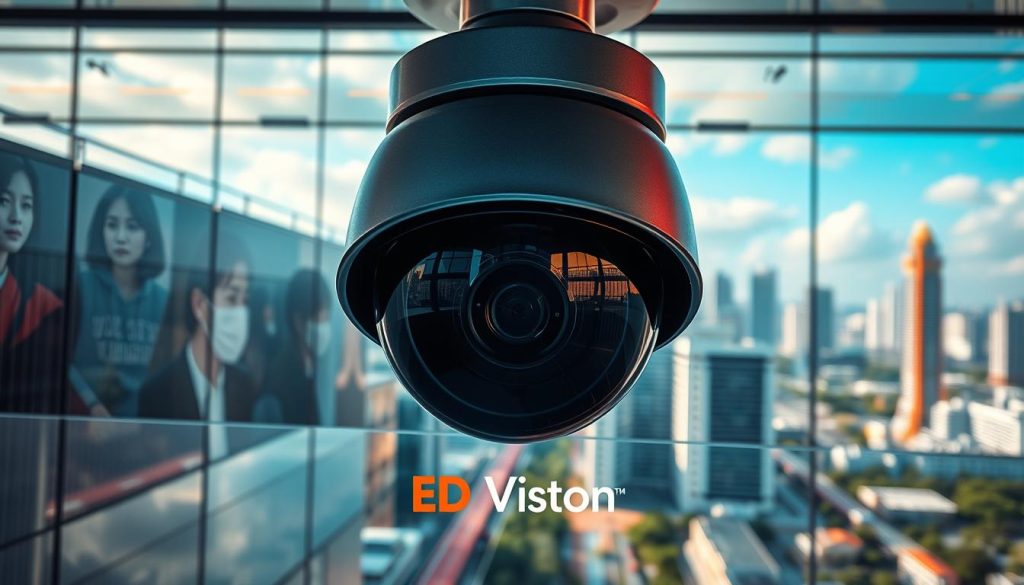Ever wondered how long CCTV footage stays in Singapore? What happens to it after that time? The length of time CCTV footage is kept is key for homes and businesses. It’s important to follow local laws and protect privacy.
As cities grow, so does the need for security. This means businesses must follow data retention rules for CCTV. With over 200,000 police cameras expected soon, knowing how long footage is kept is critical. This guide will explain the Personal Data Protection Act (PDPA) and how to set up good retention policies.
Key Takeaways
- The retention period for CCTV footage often varies based on its intended use.
- Legal frameworks like the PDPA guide organizations on proper data handling.
- Police cameras in public areas retain footage for only 31 days unless needed for ongoing investigations.
- Awareness of retention policies aids in preventing legal issues.
- Residential property owners now have more flexibility regarding the installation of CCTV cameras.
- Effective management policies are essential for safeguarding footage against unauthorized access.
For more information on the latest CCTV solutions and offers, contact ED Viston today at +65 8313 4578.
Understanding the Importance of CCTV Footage Retention
Keeping CCTV footage is key in many situations, like during investigations or legal cases. It’s vital for both groups and individuals as proof of crimes. This practice is essential for public safety, preventing crimes, and keeping communities safe.
In Singapore, there’s a rule for keeping surveillance videos. It follows the Personal Data Protection Act (PDPA). This rule makes sure people know their images are being recorded. It also says businesses can only keep these videos for as long as they need to.
Having a clear plan for keeping CCTV footage helps businesses avoid legal trouble. It also builds trust with customers. Companies like SECOM provide solutions that meet legal standards, showing they care about security and following rules.
Investing in CCTV systems does more than protect property. It also improves a company’s image. By focusing on keeping CCTV footage, businesses help make communities safer. For more information, call ED Viston at +65 8313 4578.
Legal Framework Governing CCTV Footage in Singapore
The legal rules for CCTV in Singapore are strict. They follow the Personal Data Protection Act (PDPA). This law makes sure data, like CCTV footage, is used right.
Groups using CCTV must tell people why they’re recording. They also need to keep the footage safe. Starting May 2023, HDB flat owners can put cameras in corridors without needing permission. This helps keep homes safe while following the law.
Even though more CCTV systems are being used, there are limits. Cameras can’t put people in danger or invade privacy. Also, groups might ask for money to show recorded footage. This shows how important it is to handle data correctly.
CCTV footage is key in solving crimes and disputes. It helps the police and people. Following the rules for CCTV in Singapore shows a commitment to using surveillance wisely.
For CCTV solutions that meet the latest rules, call ED Viston at +65 8313 4578. Find the best ways to protect your place.
How Long is CCTV Footage Kept Singapore?
The length of time security footage is stored in Singapore depends on several factors. Home users are advised to keep their CCTV footage storage duration for at least two weeks. This is because older footage is rarely needed for reference. On the other hand, businesses must follow the Media Development Authority’s guidelines. They usually keep footage for about 30 days.
But, if a business is investigating an incident, they need to keep the footage longer.
Typical Retention Periods
Retention periods differ based on the setting:
| Type | Typical Duration |
|---|---|
| Residential | 2 weeks |
| Commercial | 30 days |
| Banking | Up to 6 months |
Factors Influencing Retention Duration
Several factors affect how long security footage is stored:
- Storage capacity of devices
- Camera resolution
- Recording methods (continuous vs. motion-triggered)
CCTV systems with advanced features, like those from Dahua and Hikvision, can improve surveillance. They also affect how long footage is available. Regularly reviewing and assessing footage helps users manage CCTV footage storage duration effectively.
For more personalized solutions regarding your CCTV needs, feel free to contact ED Viston today at +65 8313 4578. Explore the latest CCTV options and offers.
CCTV Storage Options Available
It’s key to know the different CCTV storage options for good security management. In Singapore, you can choose from Digital Video Recorders (DVR) and Network Video Recorders (NVR). These options offer flexibility in storage and meet various needs.
DVR and NVR Storage Solutions
DVR systems use coaxial cables for data transmission, best for analog cameras. NVR systems, on the other hand, support IP cameras and can send data wirelessly. Each has its own benefits, depending on what you need. Here’s a look at how different cameras compare in storage needs:
| Camera Model | Resolution | Frame Rate (fps) | Storage Requirement (TB) | Continuous Recording Duration (Days) |
|---|---|---|---|---|
| Hikvision DS-2CD2142FWD-IS | 4 MP | 20 | 4 | 47 |
| Hikvision DS-2CD2347G1-LU | 4 MP | 30 | 6 | 70 |
| Hikvision DS-2CD2185FWD-I | 8 MP | 30 | 8 | 118 |
| Hikvision DS-2DE2A404IW-DE3 | 4 MP | 30 | 6 | 70 |
| Hikvision DS-2CD2723G0-IZS | 2 MP | 30 | 2 | 24 |
Cloud-based Storage for CCTV Footage
Cloud-based storage for CCTV footage has become more popular. It offers scalability, better security, and easy access from anywhere. It also reduces risks from hardware damage and meets storage duration rules. Cloud services are a good choice for those wanting to improve their CCTV storage.
For advice on CCTV storage solutions in Singapore, call ED Viston at +65 8313 4578. Learn about the latest offers.

Surveillance Video Retention Policies in Singapore
Companies in Singapore must create clear surveillance video retention policies Singapore that follow the Personal Data Protection Act (PDPA). These policies help decide how long video footage is kept. They make sure companies can handle and get rid of old footage safely, avoiding legal trouble.
For construction sites with a contract over $5 million, new rules require Video Surveillance Systems (VSS). These systems help spot safety risks, investigate incidents, and prevent unsafe actions. VSS must record in HD 1080 and keep footage for at least 30 days or 180 days after an incident.
Having detailed CCTV data policies helps companies meet legal standards. Reviewing these policies and getting rid of unnecessary footage builds trust with others. It shows that companies handle personal data responsibly. Companies should talk to experts to make sure their policies are up to date.
Contact ED Viston today at +65 8313 4578 to find out about the latest CCTV solutions and offers. These can improve your organization’s surveillance plan.
Guidelines from the Personal Data Protection Act (PDPA)
The Personal Data Protection Act (PDPA) was updated on May 23, 2014. It provides key rules for handling CCTV footage in Singapore. Following these guidelines is critical for companies to stay compliant.
These rules cover important areas like getting consent for CCTV, how to notify people, and limits on data use.
Consent and Notification Requirements
Companies must get consent before recording CCTV footage in public and private areas. The rules say people should know about surveillance. Notices should be clear and easy to see where cameras are.
This openness builds trust and shows respect for privacy.
Purpose Limitation Compliance
Following the data collection purpose limitation is also vital. CCTV footage should only be used for real reasons like security. Using it for other reasons is not allowed.
Companies must protect data from unauthorized access and keep it for the right amount of time. They should also delete footage when asked and give access when needed.

Knowing and following these rules helps companies protect privacy and avoid fines. For more information and help, contact ED Viston at +65 8313 4578. They offer the latest in CCTV solutions and deals.
Retention Period for Security Camera Footage
The time you keep security camera footage differs a lot between homes and businesses. It’s key to know these differences to follow the law and manage your cameras well. The Residential CCTV retention period is usually shorter than what businesses need. This shows homes and businesses have different storage needs and rules.
Residential vs Commercial Storage Needs
Homeowners should pick storage that holds at least two weeks of video. This is enough for most people, as they don’t often look at footage older than a month. But, businesses have to keep their footage for at least 30 days. This can go up if they need to share it with the police.
Industry-Specific Retention Requirements
Each industry has its own rules for Commercial CCTV storage needs. Small businesses might keep footage for two weeks, while big ones might keep it for 30 to 90 days. Banks, for example, have to keep footage for at least six months. Cloud storage in Singapore makes it easier to follow these rules.
If you want to improve your CCTV storage, contact ED Viston today at +65 8313 4578. They offer the latest in CCTV tech, tailored for your needs.
Data Retention Regulations for CCTV in Singapore
Data retention rules for CCTV in Singapore are key. They make sure companies handle video data legally. Companies must have strict rules for keeping and using footage. They also need to check their data handling often.
Following CCTV data rules protects user data and avoids legal trouble. For instance, places under watch must be clearly marked. Also, recordings of private homes are not allowed. It’s important to delete unused footage within 30 days.
Theft cases have gone up by over 25% in the first half of 2023. So, keeping CCTV data right is very important. Companies must manage their CCTV systems well to stay safe and follow the law. It’s vital to regularly delete footage that’s not needed.
If you want to know more about CCTV rules, talking to experts is a good idea. For custom CCTV solutions and deals, call ED Viston at +65 8313 4578.
Best Practices for CCTV Footage Management
Managing CCTV footage well is key for both following the law and keeping things safe. Using the best strategies helps organizations meet legal standards and protect important data. By following best practices in CCTV management in Singapore, you can boost both compliance and security. It’s important to regularly check and delete footage you don’t need.
Regular Review and Deletion of Unneeded Footage
Setting up a regular schedule for checking stored footage is smart. This helps spot footage you don’t need, so you can delete it quickly. Keeping the right policies for how long to keep footage is also important. This way, you only keep what’s really important and avoid risks.
Regular checks make sure you follow the best ways to manage CCTV footage. This ensures only the most important data is kept safe.
Securing Stored Footage from Unauthorized Access
To keep CCTV footage safe, you need strong security steps. Using encryption and physical security helps keep data safe. It’s also key to control who can see the footage by making sure only authorized people can access it.
By taking these steps, you can greatly lower the chance of unauthorized access. This makes sure clients and others know their data is safe. In today’s world, using the best CCTV management practices in Singapore is a must.
If you need help improving your CCTV management, contact ED Viston today at +65 8313 4578. Learn more about the latest CCTV solutions and offers.
Consequences of Non-Compliance with Retention Policies
Organizations that don’t follow CCTV retention policies face big risks. The non-compliance consequences CCTV data include big fines, legal trouble, and harm to their reputation. The Personal Data Protection Act (PDPA) makes non-compliance a serious issue.
In Singapore, the PDPA requires strict data retention policies, including for CCTV footage. It’s important to know how long to keep footage. Not following this can hurt a company’s reputation and trust with clients and partners.
Companies must follow the PDPA’s rules, like being clear about data collection and giving people access to their data. Not following these rules can lead to data breaches and even mandatory breach notifications. This could mean investigations by the Personal Data Protection Commission (PDPC).
Having a strong CCTV retention policy is key to avoiding these risks. By focusing on responsible data management and following PDPA guidelines, businesses can handle data retention well.
For more information on CCTV solutions and offers, contact ED Viston today at +65 8313 4578.
Conclusion
In Singapore, the rules for keeping CCTV footage are clear. Companies must follow these rules to build trust and keep data safe. They use CCTV to make workplaces safer and check if safety rules are followed.
Using CCTV comes with strict rules and a big cost. Small to medium businesses need to keep checking their CCTV plans. This helps them stay up-to-date with laws and meet their needs well.
If you need help with CCTV rules in Singapore, contact ED Viston at +65 8313 4578. They can help you find the right CCTV technology for your business.
FAQ
How long is CCTV footage kept in Singapore?
What is the importance of having a CCTV footage retention policy?
What legal framework governs CCTV footage retention in Singapore?
What factors influence the retention duration of CCTV footage?
What storage options are available for CCTV footage in Singapore?
What are the guidelines regarding consent and notification for CCTV systems?
How do retention periods differ between residential and commercial CCTV installations?
What best practices should organizations follow for managing CCTV footage?
What are the possible consequences of not following CCTV retention policies?
Source Links
- https://www.channelnewsasia.com/singapore/police-cameras-tender-launched-double-number-200000-mid-2030s-3882691
- https://sgcctv.com.sg/cctv-camera-laws-in-singapore/?srsltid=AfmBOopphdX8tGtM5mAalu73oMZtWJ9KhsCTembnIx6QNQOU2cTrU-5X
- https://coruzant.com/security/navigating-the-legalities-of-cctv-installation-in-singapore/
- https://mediaonemarketing.com.sg/reasons-business-needs-surveillance-cameras-cctv-in-singapore/
- https://entrycare.com/cctv-law-singapore/
- https://sgcctv.com.sg/cctv-camera-laws-in-singapore/?srsltid=AfmBOoranjxMVxZU5sBznVJ066afX1W7XPg1vZAFYTd4_UM4s4pzRd5-
- https://www.safetrolley.com/singapore-police-install-high-tech-cctv-cameras-fight-crime/?srsltid=AfmBOopSoaCR689aZcOAiq_GTx0BskbLouMuywXyIJvuHkGKkolw64F7
- https://www.privacy.com.sg/resources/cctv-law-singapore/
- https://cctvcamera.com.sg/
- https://www.firstsolution.com.sg/choosing-the-best-storage-option-for-your-office-cctv/
- https://web.securitysystem.com.sg/cctv-camera-for-hdb-flat/
- https://www.secom.com.sg/products-services/cctv-surveillance-system.html
- https://www.mom.gov.sg/workplace-safety-and-health/safe-measures/sectoral-level/video-surveillance-system-for-construction-sector
- https://www.pdpc.gov.sg/-/media/files/pdpc/pdf-files/advisory-guidelines/ag-on-selected-topics/advisory-guidelines-on-the-pdpa-for-selected-topics-(revised-may-2024).pdf
- https://www.ismartcom.com/blog/pdpa-compliance-and-cctv-surveillance-legal-considerations-in-singapore/
- https://www.pdpc.gov.sg/-/media/Files/PDPC/PDF-Files/Advisory-Guidelines/AG-on-Selected-Topics/Advisory-Guidelines-on-PDPA-for-Selected-Topics-310322.ashx?la=en
- https://web.securitysystem.com.sg/how-long-can-cctv-footage-be-kept/
- https://www.d-ron.com/articles/cctv-cameras-in-singapore-for-offices/
- https://web.securitysystem.com.sg/cctv-law-singapore/
- https://www.brlawcorp.com/news-and-insights/conflicts-between-the-pdpa-and-other-singapore-laws
- https://www.firstsolution.com.sg/blog/how-to-legally-install-cctvs-in-singapore/
- https://www.firstsolution.com.sg/cctv-surveillance-system-for-retail-businesses-in-singapore/
- https://www.pdpc.gov.sg/-/media/Files/PDPC/PDF-Files/Advisory-Guidelines/AG-on-Key-Concepts/Advisory-Guidelines-on-Key-Concepts-in-the-PDPA-1-Oct-2021.pdf?la=en
- https://www.cookieyes.com/blog/singapore-pdpa/
- https://sso.agc.gov.sg/Acts-Supp/40-2020/
- https://www.cctv-camera.com.sg/articles/cctv-for-employee-monitoring-pros-and-cons.html
- https://www.pdpc.gov.sg/-/media/Files/PDPC/PDF-Files/Sector-Specific-Advisory/Advisory-Guidelines-for-Management-Corporations—110319.pdf

